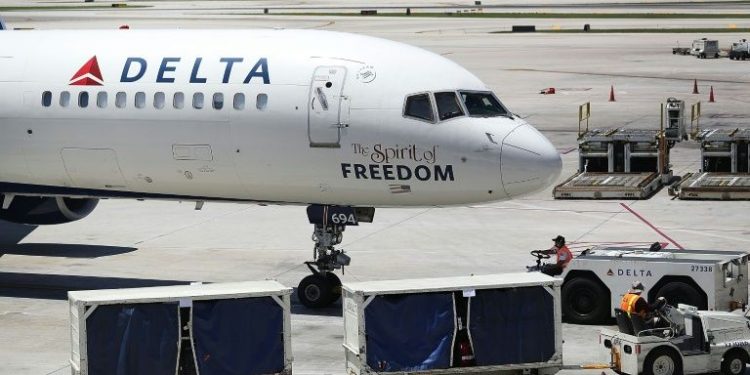The U.S. Department of Transportation is fining Delta Air Lines $50,000 for alleged discrimination against Muslim passengers in two separate incidents in 2016.
Atlanta-based Delta disagrees with the DOT’s contention that it engaged in discriminatory conduct, according to a DOT consent order issued Friday. The consent order comes after the Council on American-Islamic Relations requested a federal investigation into one of the incidents, involving passengers Faisal and Nazia Ali, U.S. citizens of Pakistani descent who were headed home after a trip to France.
According to the DOT, the couple boarded a Delta flight in Paris on July 26, 2016 to return home to Cincinnati. Nazia Ali wears a hijab, a religious headscarf, CAIR said.A passenger told a flight attendant that the couple’s behavior during boarding made her nervous, according to the DOT.The flight attendant “reportedly claimed that Faisal Ali tried to hide his cell phone and was sweating and that he said the word ‘Allah,’ ” according to CAIR.
The organization said Ali put his phone in his pocket after texting his mother to let her know they were on the plane, and that the flight had been delayed at the gate and it was warm on the plane. The flight attendant said “Mr. X made eye contact with her but did not smile,” and another flight attendant saw Mr. X texting on his phone “and as she passed, he changed his screen,” the DOT consent order says.
Both flight attendants spoke with the captain, who conferred with Delta’s corporate security, which told the captain that the couple was U.S. citizens returning home and there were “no red flags” according to the DOT. The captain had the couple deplane to take a later flight. A security officer interviewed them, then reported to Delta’s corporate security that they were clear to travel.
However, the captain refused to accept the couple back onto the plane “because the flight attendants were not comfortable” having them on the flight, the DOT says. The couple was escorted back to the terminal, allowed to leave without any further security screening and rebooked on a Delta flight the next day, according to the consent order.
The DOT said it appears that but for their perceived religion, “Delta would not have removed or denied them re-boarding.”Government flags separate 2016 incidentIn another incident on July 31, 2016 on a Delta flight, the DOT says a Muslim passenger it calls “Mr. A” boarded a flight in Amsterdam bound for New York, and passengers observed someone who appeared to give him a small package. Flight attendants saw that Mr.
A moved to a window seat and “looked outside the window constantly, and appeared to be perspiring,” according to the DOT.A first officer saw nothing remarkable about Mr. A and Delta corporate security told the captain Mr. A’s record had “no red flags” and the captain decided to proceed with the flight.
But after flight attendants expressed “that they remained uncomfortable,” the captain changed his mind, returned to the gate and asked that Mr. A be removed and booked on a later flight, the DOT says in its consent order. Mr. A was not subject to additional security screening before being rebooked.
The DOT says it finds the captain’s removal of Mr. A from the flight after being cleared was discriminatory. Nearly 100 discrimination complaints in 2018Federal law says the pilot in command of a plane is the final authority on the operation of the plane and any decision to refuse to transport a passenger. But federal law also prohibits any decision by an airline to refuse to transport someone based on their race, color, national origin, religion, ethnicity or sex.
The DOT received 96 complaints regarding discrimination in air travel in 2018, including complaints based on race and religion, according to the most recent full-year Air Travel Consumer Report data. The three major airlines had the most such complaints: American had 21, Delta had 15 and United had 12.
The DOT enforcement office said it “views seriously Delta’s violations” and believes enforcement action is warranted. The consent order directs Delta to cease and desist from such violations, assesses $50,000 in civil penalties, and mandates civil rights training to certain Delta crew members and customer service representatives.
The training “must make clear that, in the absence of a valid safety or security concern, passenger or crew discomfort is not an acceptable basis to deny transportation,” the DOT says.
Delta did not dispute that the two incidents “could have been handled differently,” but said that does not necessarily mean it acted improperly, according to the consent order. Delta said a customer who identified herself as a retired Federal Aviation Administration safety inspector reported “what she considered to be suspicious conduct,” and that in both cases, “Delta maintains that it acted on observations of behavior, rather than identity.”
But according to the consent order, Delta also said it is “always open to enhancing its training program in the area of cultural sensitivity.”Delta “asserts that it has learned from the two incidents at issue here, and has improved its processes because of them,” according to the consent order.
In a statement Friday, Delta said “it is our goal to model inclusion.”The airline said it has “worked to improve our investigative process since these incidents and we have supporting programs, policies, training and procedures that back up our commitments in this area.”






































